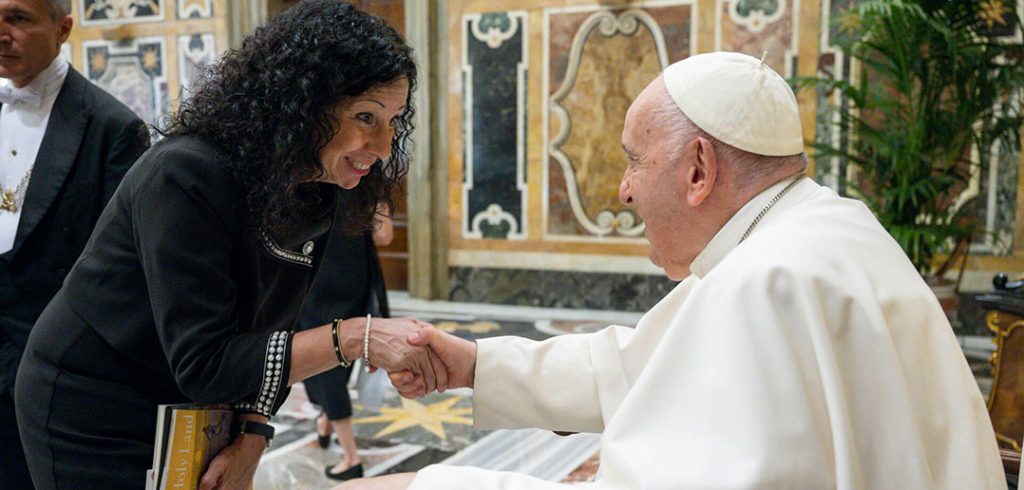The Global Aesthetics of the Catholic Imagination, which took place May 25-27, featured a private audience with Pope Francis, who in his remarks encouraged attendees to “not domesticate Jesus” in their works.
Angela Alaimo O’Donnell, associate director of Fordham’s Curran Center for American Catholic Studies, agreed with Francis and said that his comments were the highlight of the conference for her.
“There is a sense in which, over the centuries, we have received many images of Christ. But the true Christ escapes any attempt at trying to domesticate him, to capture him and say, ‘This is Jesus, and only this is Jesus,’” she said.
A ‘Superabundant’ Experience
She said the conference’s watchword was “superabundant,” a word Pope Francis used to describe the place where people experience God, “like a continually overflowing basin.”
O’Donnell was moved by Francis’ challenge to “go beyond set bounds, to be creative without downplaying your own spiritual restlessness and that of humanity, to embrace poetically the anxious yearnings present in the human heart.”
Her own writing is often set in the context of her Catholic faith, and at the conference, she participated in three panels, Contemporary Catholic Poetry, The Presence of Dante in the Contemporary Catholic Imagination, and The Global Reach of Flannery O’Connor.
Exploring the ways Christ is present across cultures was a key aspect of the conference, as it was the first international iteration of a series of gatherings dedicated to the Catholic literary imagination that began in 2015, and which Fordham hosted in 2017.
Scorsese’s New York
A close second high point for O’Donnell was Scorsese’s lengthy conversation with Antonio Spadaro, S.J., editor-in-chief of the journal Civilta Cattolica which, along with the Curran Center and the office of Mission & Ministry at Georgetown University, and Loyola University Chicago’s Hank Center for Catholic Intellectual Heritage, sponsored the conference.
Scorsese shared memories of growing up in New York City’s Little Italy and aspiring to follow in the footsteps of a priest at the Basilica of St. Patrick’s Old Cathedral. He reflected on films such as Mean Streets, in which actor Harvey Keitel’s character asserts that “you don’t make up for your sins in church. You do it in the streets,” He also made news by announcing that he is planning to follow up his 1988 film The Last Temptation of Christ with a new movie about Jesus.
Tempted by the Ordinary
O’Donnell was particularly moved by his thoughts on The Last Temptation of Christ. The last part of the movie features Jesus imagining what would have happened if, instead of giving himself up for death, he’d married Mary Magdalene and started a family.
“What Scorsese said about this, which I thought was so beautiful, was, Satan offers Jesus food, money, and all the power in the world, and he’s not tempted by that,” O’Donnell said.
“What he’s finally tempted by is the beauty of ordinary human life. He doesn’t give in to that temptation, but nonetheless, this is a very affirming vision of what it is to be a human being.
“I was very struck that [Scorsese] … acknowledges that human life is very beautiful, especially as he’s made movies that incorporate violence, suffering, and all the very dark elements of human experience.”


